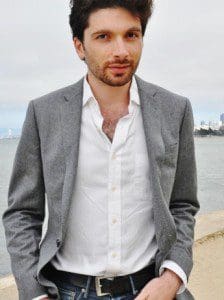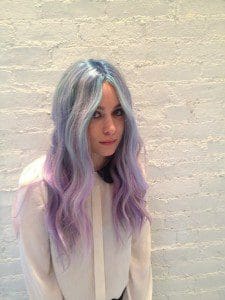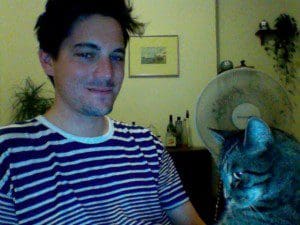Nathan Heller, Molly Young, and Willy Staley are three working writers in New York. Heller was recently named a staff writer at The New Yorker and is also a TV and film critic for Vogue. Young is a feature writer at New York magazine, and Staley (who I used to skateboard with in high school) writes regularly for the New York Times and the New York Times Magazine.
All three are in their late twenties, and, interestingly, all three grew up in San Francisco. (Heller rode the 43 Masonic to high school, Young the 38 Geary, and Staley the 24 Divisadero.) Young, who recently profiled Tumblr’s David Karp, learned to surf in Bolinas. Heller, who has a piece on San Francisco’s new entrepreneurial culture in the latest New Yorker, has not forgotten the pleasures of a burrito at La Corneta. And before interviewing Earl Sweatshirt of Odd Future for the Times, Staley perfected his craft, in part, writing a well regarded blog on the Bay Area rap scene called nationofthizzlam.com.
We asked them about growing up in San Francisco, how that may have shaped them as writers, and what they miss about the city and the Bay Area.
***
ZYZZYVA: You attended Lick-Wilmerding, a socially conscious, private high school in San Francisco. In what ways did this institution help you discover yourself as a writer?
Nathan Heller: One of Lick’s goals at that time—probably still—was to bring together a pretty eclectic mix of people. I was there essentially as part of the weirdo quota. But this meant it was a really fun place to be. I’ve learned it’s fashionable to have hated high school, but this wasn’t the case for me. I really liked my classmates. I had a great time. The principle of eclecticism applied to teachers, too. Faculty members had these really colorful previous lives. For instance, Robin von Breton, who was an English teacher—I’m still in touch with her—had studied under Robert Lowell during his medium-crazy period in the late Sixties and then co-founded a weekly newspaper in New Orleans. She’s kind of a genius. Another English teacher, James Harris, had done some broadcasting and, I believe, is now on the East Oakland school board. Don Negri, a French teacher, was amazing on Candide because, decades earlier in a galaxy far away, he’d done a doctorate in Enlightenment philosophy. I have a hunch that if you’re raised on a weird mix of ideas and experiences as a kid, it’s easy to end up a certain kind of writer. It seems of a piece with the intellectual flavor of the Bay Area, too.
Also, I did the school newspaper. People used to drag in whatever writer friends or family members they had to talk to the class. I remember one spring someone brought in a friend’s big brother. Nobody had really heard of this guy, but he had his first book coming out—it was just coming out that week, I think—which was exciting, because we did not always get the kind of writer who actually wrote books. “I’m hoping it does all right!” he said. Then he spent most of the time talking about his great enthusiasm for truck magazines. This was Dave Eggers, and in fact his book ended up doing all right. Later he talked about Iceland, where he had his journal printed, and how much fun it was. I kind of filed that away, and ended up there a few years later.
Z: Are there aspects of your sensibility that you feel are uniquely Californian?
NH: My first reaction is to say that this kind of claim is preposterous. I mean, we live in the age of JetBlue and the Internet, so how strong could regional sensibility be? But I do wonder. In college I did a workshop with the poet Jorie Graham. We’d do the workshopping around the table, and then in office hours she’d go over our work individually, line by line. At some point when we were looking over something I’d written, she stopped in the middle of a stanza and said, “You’re from the Bay Area or something?” She said she could hear it in the sound and rhythm of the sentences. Maybe she was pulling my leg. But I’ve thought about that a certain amount. Especially because a surprising number of the writers and artists I don’t just admire but really get at some effortless, visceral level—people like Serra, Diebenkorn, Heizer, Hass, Didion, et cetera—are Northern California people. Then again, a lot of other Bay Area artists do nothing for me. I will say that the Bay Area is where I personally feel creatively sharpest.
Z: What is about San Francisco that still speaks to you?
NH: I’m a big walker, and it’s a very walking-friendly city—I think that, paradoxically, the hills make it more so. One of my favorites in recent years has been to take the Filbert steps up the back of Telegraph Hill, then follow Lombard down into North Beach. I also like the walk from Crissy Field to Fort Point—that strip that got fancified a few years ago. It’s gorgeous on a clear day, but I love it even on gray days, when the moisture from the fog clings to your eyebrows. I like to climb up onto the parapet of the fort, where you have the ocean on one side and the bay on the other. The wind through the mouth of the bay almost plows you down. The landscape feels invigoratingly alive. Where else? I grew up near Tank Hill, so I’m always walking around there. And I have grandparents who have been for sixty years on a hill in Marin—since before there was a Marin, almost—so I sometimes wander that area, too. The smell of the foliage on those hills is completely unique.
Z: Both Brooklyn, where you reside, and San Francisco have high concentrations of writers and yet the cultural/literary climate is quite different. Could you speak to these differences?
NH: It’s interesting—I actually did some reporting from San Francisco over the summer, so I’ve been hanging around a bit more recently, trying to keep my eye on things. This is one of several questions that’s been vaguely on my mind. I don’t have a smart answer at the moment. They’re definitely different. When writers get together in New York, they usually complain. I’m not sure whether this is yet de rigeur in the Bay?
One thing I’ll say—though I’ll probably be assassinated if this gets back to New York—is that the independent and used bookstore scene seems stronger in San Francisco. Indie bookstores in New York are often either gigantic or tiny. They tend to use their space awkwardly, and their collections often seem eccentric, not necessarily in a satisfying way. San Francisco appears to have more indie bookstores per capita—maybe that’s just an illusion, but it’s my sense—and a lot of them are a good mid-range size, and pleasant. I’m mildly obsessed with that window in the poetry room at City Lights. It’s such a strange thing. Places like Book Passage and Green Apple and Booksmith do great work. For a few brief, glorious years in my youth there was a Black Oak on Irving that I used to walk to. Everything about it was perfect. I had this sense that whoever was stocking the books had exactly my kind of mind. Then it closed.
Z: What do you miss most about San Francisco?
NH: As I said, I love the way the local landscape is constantly in motion. This has to do partly with the city’s geographic atomization. The way that you get these jasmine scented breezes in one neighborhood and eucalyptus in another. Or the way you can climb a hill some cool night and actually see the fog sweeping past your face. To me this is very sensual. I find San Francisco a deeply romantic city. I’m drawn to certain of the Northern European capitals—places like Copenhagen and Berlin in fall—and I think it’s because their landscapes behave in similar ways. There’s a similar sense of mystery and hidden energy about them.
The other thing I always miss—though this is something of a cliché—is the Mexican food. It’s always the first thing I eat when I’m back in town. Every now and then there will be a new Mexican restaurant that people are excited about in New York, and my hopes rise. But it’s always a disaster. Maybe it’s something in the water.
***
ZYZZYVA: You went to college on the East Coast. Did your professors have any biases against West Coast kids?
Molly Young: The professors didn’t, but the students did. It had to do with the cadence of West Coast speech, which is more relaxed and slang-enlivened than the way a lot of East Coast kids speak. My wildly over-generalized theory is that East Coast kids grow up imitating their parents while West Coast kids grow up imitating their peers.
Z: In what ways do you feel that your Bay Area upbringing was an asset and in what ways has it been a deficit to your literary endeavors?
MY: I think the only real asset to writing is reading, and books, luckily, can be read anywhere—I just happened to read them in the Bay Area. What did help was living a few blocks away from Green Apple, which must be one of the best used bookstores in America. (Everything I learned about sex I learned from lurking in the “Sociology” section of that store.)
Z: I loved your gorgeous essay “Sweatpants in Paradise” which appeared in The Believer. In the essay you explored adolescent life in California—and consumerist depictions of it— in a way that was at once lyrical, philosophically astute and yet unvarnished. Do you find yourself thinking about your own adolescence often?
MY: First: Thanks! That’s really nice of you to say.
I think a lot of writers and artists in general refer to those years a good deal. Those are the years when most people are at their peak of emotional vulnerability, so the deepest scars are inflicted at that time. And that’s also when a lot of defining pleasurable experiences happen, like having your first boyfriend/girlfriend, your first best friend…
Z: Do you identify strongly with quintessentially Californian writers like Joan Didion, Nathaniel West?
MY: I admire them more than identify with them, but many of my favorite writers are people who worked in California and are associated with a West Coast sensibility: Raymond Chandler, Nathanael West, Summer Brenner, Daniel Handler.
Z: Do you feel like your work reflects a uniquely Californian sensibility?
MY: I’m not sure I could isolate a common denominator among writers that might reflect a California sensibility—not because there isn’t one, but because I’m terrible at that sort of structural thinking. I do think parts of California (like San Francisco and Bolinas) are far more permissive of weirdness than most places, and every good writer is more than a little weird.
Z: What do you miss most about the San Francisco/Bay Area?
MY: Everything is smaller on the East Coast—trees, views, cliffs, beaches. The scale of nature makes me feel like I’m wandering around the set of a play. I miss the vast scale of California.
***
ZYZZYVA: Tell me about the neighborhood you grew up in.
Willy Staley: I grew up in Noe Valley and I was really attached to it. My first jobs were in Noe Valley (Manhattan Bagel and Tom & Dave’s Juice It!, both on 24th Street), my best friends lived in Noe Valley, and I was inordinately proud of being from this silly little windy, yuppie neighborhood. I remember it being compared to Lake Wobegon the year one of the alt weeklies named it best neighborhood in the city. I can’t argue with the comparison. It was really great growing up there—and I’ll never ever be able to afford it for myself.
I think this is why I tend to gripe a bit about the direction San Francisco appears to be going in. I love it so much, and I’ll never be able to have it again. I think this sums it up: When I was a little kid going to play baseball or whatever at the local schoolyard, the older kids would fuck with us, throw bottles, whatever. My brothers and I were absolutely terrified of them. Then, by the time I was older, little kids with lacrosse sticks would routinely show up at Alvarado while I was skateboarding and really rudely point out to me that it wasn’t allowed. I’m talking about six-year-old kids going up to strange teenagers, telling them they’re breaking the law. Really indignantly! And what were we gonna do? Throw bottles at them? We were way too nice for that. It’s hard to even imagine what the next generation of kids in that neighborhood will be like.



